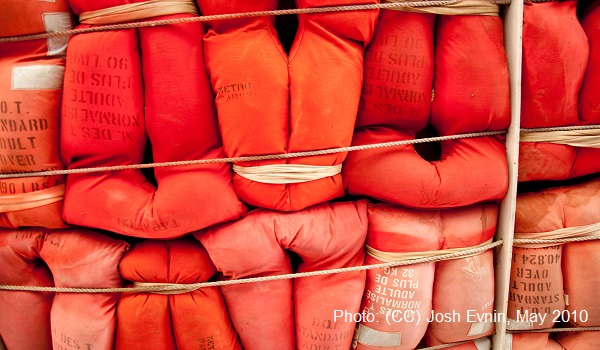The UNAVFOR MED IRINI mandate without search and rescue component is extended until 31 March 2023. At the first meeting of the European Search and Rescue Contact Group, European Commissioner for Home Affairs, Ylva Johansson reiterated the message that no one must be criminalised for saving lives but also the need for compliance with safety rules and registration. Spanish prime minister, Pedro Sanchez, has launched new policy under the frame ‘Africa Focus 2023’ with the ambition to enhance migration control, readmissions and return. Meanwhile, distress, death and return continue in the Mediterranean and Atlantic.
On 26 March the Council extended the mandate of the EU Common Security and Defence Policy (CSDP) military operation in the Mediterranean – EUNAVFOR MED IRINI until 31 March 2023. The core task remains contribution “to the implementation of the UN arms embargo on Libya” and a secondary task is still contribution “to the disruption of the business model of human smuggling and trafficking networks through information gathering and patrolling by planes.” Search and rescue efforts are still not included in the mandate. High Representative of the EU for Foreign Affairs and Security Policy, Josep Borrell clarified in April 2020 “These ships are not patrolling the sea looking for people to be rescued” while also underlining that they would abide by international law. UNHCR Special Envoy for the Western & Central Mediterranean situation, Vincent Cochetel commented: “Operation IRINI extended by the European Council for 2 years. It does not prevent weapons to reach Libya nor human trafficking. All this capacity could save lives in the Mediterranean Sea if it was its mandate & the agreed priority of EU member states”. While the previous EU naval mission Sophia rescued some 45,000 people the IRINI operation has according to the European Commission not rescued anyone a year after it was launched.
At the first meeting of the European Search and Rescue Contact Group, launched in September 2020 alongside the European Pact on Migration and Asylum, European Commissioner for Home Affairs, Ylva Johansson called saving lives at sea: “a moral duty and a legal obligation, and a priority for the European Union”. She regretted the loss of 21,000 lives at sea since 2014. Noting that the Commission has no legal competence to coordinate search and rescue operations, the Commissioner urged increased involvement of member states in coordinating search and rescue operations, as ports of disembarkation, as flag state of private vessels, and as home countries of NGOs or shipping companies. Further the Commissioner reiterated that: ”No-one must be criminalised for helping people and saving lives. That is unacceptable”. However, Johansson continued: “But no matter how noble the purpose, safety at sea must be guaranteed. For all aboard. Crew and people rescued. Ships must be properly registered and equipped”. Member states have repeatedly used red-tape and security regulations as means to block civil search and rescue vessels in ports or to seize them. MEP Erik Marquardt from the Group of the Greens/European Free Alliance has commissioned a study outlining a potential strategy for the Commission, suggesting that it is within its mandate to support civil search and rescue operations directly.
On 29 March, Spanish prime minister, Pedro Sanchez presented a new initiative entitled “Africa Focus 2023”. Referring to Spain as “Europe’s southern gateway” Sanchez expressed hope that investing in Africa would create opportunities: “for young people within their own countries, offering them an alternative to attempting the journey to Europe in search of work and a better life”. With agreements including migration management and control measures already established with Morocco, Mauritania and Senegal among other countries, Spain is seeking to enhance the geographical scope of investment and cooperation across the African continent including on migration management.
On 29 March, the International Organization for Migration (IOM) reported that nearly 1,000 people were intercepted and returned to Libya over just 48 hours, according to spokesperson, Safa Msehli ending up in detention under “appalling” conditions. More than 4,500 people have been brought back to Libya this year after attempting to reach Europe via the deadly Mediterranean route.
The NGO hotline Alarm Phone reported several distress calls over the past week and delays or lack of response from authorities including a boat left in severe distress off Libya despite continued calls by the organisation to the so-called Libyan coast guard that remained non-responsive. 5 people have reportedly already drowned and the fate of another 85 remains unknown. Between 26 and 28 March five people lost their life trying to reach Spain. At least two people died off the coast of Murcia in the south-east of the country, three people were rescued and nine remain missing. Another three lives were lost off the Canary Island of Tenerife and 42 people were rescued by local fishermen and Spanish authorities. In three rescue operations over 24 hours on 28 and 29 March, all in Maltese waters, the Spanish NGO Open Arms saved 219 people including 56 children, 17 under the age of ten, and two pregnant women. After 5 days at sea and two medical evacuations, Italian authorities granted the vessel permission to disembark the remaining 209 survivors in Pozallo, Sicily.
The Canary Islands saw 239 arrivals by sea on March 27 and 28 with six boats landing in Gran Canaria, Tenerife and La Gomera.
For further information:
- ECRE, Med: Prosecutor Calls for Trial of Salvini as Italian Crack-Down on Civil Search and Rescue Operators Continues Amid Tragedy and Rescues, March 2021
- ECRE, Atlantic Route: Distress Cases, Deaths, and Transfers to Camps, March 2021
Photo: (CC) Josh Evnin, May 2012
This article appeared in the ECRE Weekly Bulletin. You can subscribe to the Weekly Bulletin here.

